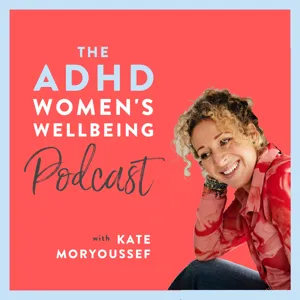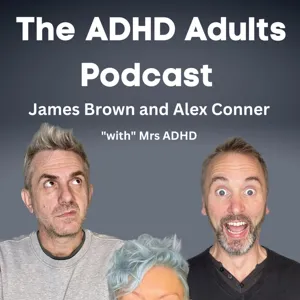Podcast Summary
ADHD and Emotional Dysregulation for Women: ADHD affects women's emotional processing, leading to emotional instability, requiring strategies to manage emotions effectively
ADHD affects how people process emotions, leading to emotional dysregulation, especially for women due to the additional influence of hormones. During the ADHD Women's Well-being podcast, Kate Moore welcomed clinical psychologist and ADHD advocate, Dr. Marcy Caldwell, to discuss this topic. Dr. Caldrew explained that ADHD brains process emotions differently than neurotypical brains, causing emotional instability and making it challenging for individuals to manage their emotions effectively. This emotional dysregulation can feel debilitating and derail daily life, especially for women. Dr. Caldrew's work focuses on helping people develop strategies to manage their emotions and regain control, enabling them to live more balanced lives.
ADHD and intense emotional shifts: People with ADHD experience intense emotional shifts due to brain's difficulty filtering stimuli and focusing attention. Embracing and processing emotions can help reduce overwhelm and create balance.
Individuals with ADHD experience intense emotional shifts due to their brain's unique functioning. Their brains have a harder time filtering out external stimuli, leading to constant overstimulation. Additionally, their attention operates more like an on-off switch, causing emotions to go from 0 to 60 seemingly instantly. This emotional rollercoaster can lead to feelings of overwhelm and a lack of coping strategies. However, a potential solution is to embrace and engage with difficult emotions rather than trying to suppress them. By actively acknowledging and processing emotions, individuals can reduce the build-up and potential for overwhelming emotional responses. This approach can help create a more balanced emotional experience.
Managing Sources of Overstimulation: Proactively managing sources of overstimulation through creative problem-solving, tools, and scheduling buffer periods can improve emotional regulation and reduce overall impact on well-being.
Identifying and managing sources of overstimulation in our daily lives can help improve emotional regulation and make things more manageable. This can be achieved through creative problem-solving, such as entering a room before a loved one to quiet a barking dog, or using tools like earplugs or blue light glasses. Additionally, scheduling buffer periods between tasks can help prevent emotional dysregulation and ensure we have the patience and tolerance to handle unexpected situations with our children. By being proactive and intentional about managing overstimulation, we can reduce its overall impact on our emotional well-being.
Managing emotional dysregulation for individuals with ADHD: Intentional efforts and small habit changes can help manage emotional dysregulation for individuals with ADHD. Reducing overstimulation from external sources can prevent emotional explosions and improve emotional regulation for both parents and children with ADHD.
Managing emotional dysregulation, a common challenge for individuals with ADHD, requires intentional efforts and small habit changes. Overstimulation from external sources can trigger emotional explosions, especially at home where we prioritize being the best parents we can be. Creating a buffer, or a moment of pause, between activities can help prevent this. For example, putting away distractions like phones or avoiding excessive WhatsApp groups can reduce overstimulation and help us show up as our best selves. Modeling these habits for our children with ADHD can also be beneficial. By recognizing and addressing these sources of overstimulation, we can better manage our emotions and live in alignment with our values and intentions.
Noticing physical sensations can help identify emotional overwhelm: Practice self-awareness and mindfulness to recognize early signs of emotional overwhelm, such as tension, shallow breathing, and increased heart rate. Use techniques like EFT or deep breathing exercises to calm your body and prevent a stress response.
Becoming aware of the physical sensations in your body can help you identify emotional overwhelm before it escalates into a full-blown stress response. By noticing early signs such as tension, shallow breathing, and increased heart rate, you can take steps to manage your emotions and prevent a complete meltdown. This requires practicing self-awareness and mindfulness, and learning techniques such as EFT (Emotional Freedom Technique) or deep breathing exercises to calm your body and reduce stress. By recognizing the early warning signs and responding proactively, you can stay in control and avoid the negative consequences of emotional overwhelm.
Practicing emotional regulation techniques like going for a walk or using EFT can help during emotionally charged situations.: Emotional regulation techniques, such as going for a walk or using EFT, help separate from irrational thoughts, reduce physiological build-up, and engage the rational brain. Modeling these behaviors for children equips them with emotional resilience tools.
Practicing emotional regulation techniques, such as going for a walk or using Emotional Freedom Technique (EFT) or Tapping, can help bring perspective and calmness during emotionally charged situations. These methods allow us to separate from irrational thoughts, reduce physiological build-up, and engage our rational brain. Modeling these behaviors for children is essential, as it equips them with essential emotional resilience tools. If journaling feels intimidating due to ADHD, an alternative called the "tap and talk technique" can be used, which combines journaling with tapping to effectively process emotions. This simple and effective method can be practiced by anyone, regardless of age.
Heightened sensitivity to rejection for individuals with ADHD and RSD: Individuals with ADHD and RSD experience heightened sensitivity to rejection, criticism, and failure due to neurological differences and past experiences. Seek professional help and resources to manage emotions effectively and try stress-reducing techniques like Tapping.
Individuals with ADHD, particularly those with Rejection Sensitivity Dysphoria (RSD), experience heightened sensitivity to perceived and real-life rejection, criticism, and failure due to neurological differences and past experiences. RSD, a term coined by Dr. William Dobson, affects productivity and stems from the ADHD brain's filterlessness and a history of social difficulties. This sensitivity can result in the brain being overprotective and seeking out rejection to shield itself. It's essential to understand that this sensitivity is not a character flaw or a failure but a neurological condition. If you suspect you may have RSD, it's important to seek professional help and resources to learn more about it and manage your emotions effectively. Tapping, a stress-reducing technique, can also help regulate emotions and improve overall well-being.
Bruised Brain from Past Rejections Leads to Fear of Rejection for Individuals with ADHD: ADHD individuals may have heightened fear of rejection due to past experiences, leading to self-imposed limitations and emotional stress. Women with ADHD may experience this sensitivity more acutely due to hormonal cycles. Awareness and protective measures can help mitigate the impact.
Individuals with ADHD may have a "bruised brain" due to past experiences of perceived rejection, leading to a heightened fear of rejection and a self-imposed limitation of their lives. This sensitivity can stem from childhood experiences and manifest in various ways, including imposter syndrome and constant stress at work. Women with ADHD may also experience this sensitivity more acutely due to hormonal cycles. Awareness of these patterns and cycles, as well as taking steps to protect oneself during vulnerable times, can help mitigate the impact of rejection sensitivity disorder.
Creating emotional buffer zones: Buffer zones, like screen-free time and self-care days, help manage emotions and respond effectively to challenges. Prioritize self-care and embrace unique qualities for emotional resilience.
Being aware of our emotional cycles and creating buffer zones, especially screen-free ones, can help us manage our emotions and respond effectively to challenging situations. These buffer zones allow us to tap into our bodies and assess our emotional state, enabling us to choose our next action wisely. Additionally, scheduling a self-care day every month can provide much-needed time for regrouping and reenergizing, rather than viewing it as a day to be dreaded. By giving ourselves permission to prioritize self-care, we can approach these days with a positive mindset and honor our emotional needs. Just as a sick day can sometimes feel restorative, a self-care day can offer a similar experience of relaxation and rejuvenation. Finally, learning to work with our brains and embrace our unique qualities, rather than constantly resisting them, can lead to greater emotional resilience and overall well-being.
Managing Emotions for ADHD Brains: ADHD brains face unique emotional challenges. Marcy DePina's digital course, Meltdown to Mastery, offers a 5-step framework to help manage emotions and build effective strategies for long-term success. Accessible resources at adept.org.
Understanding the unique challenges of ADHD brains and implementing tailor-made strategies can make managing emotions and dealing with rejection feel more effortless. Marcy DePina, an expert in this field, emphasized the importance of awareness and accessibility of such strategies through her digital course, Meltdown to Mastery. This course, specifically designed for ADHD brains, offers a 5-step framework to help individuals effectively manage their emotions and build upon strategies that work for their unique brain type. By making these strategies more accessible, individuals with ADHD can better navigate their emotional landscape and find long-term success. To learn more and access these resources, visit Marcy's blog at adept.org or explore her Meltdown to Mastery digital course.




